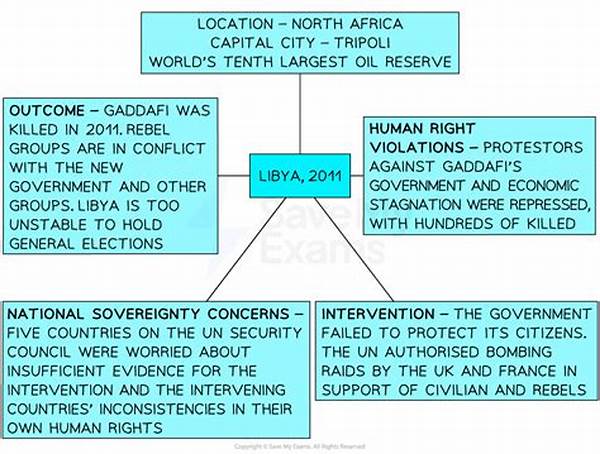In the intricate landscape of international relations, the interplay between national sovereignty and external interventions is a subject of significant discourse and analysis. This article examines the ramifications and implications arising from situations where the autonomy of a state is challenged by external influences. Through a comprehensive exploration of these dynamics, we aim to shed light on the delicate balance between respecting a nation’s self-governance and addressing broader global concerns.
The Conceptual Framework of National Sovereignty and External Interventions
National sovereignty is fundamentally characterized as the full right and power of a governing body over itself, without any interference from outside sources or bodies. It is a cornerstone principle in international law and politics, ensuring that states have the autonomy to govern their affairs as they see fit. On the other hand, external interventions refer to the actions taken by one or more countries to influence or directly involve themselves in the domestic affairs of another nation, often justified on humanitarian grounds or security reasons. The intersection of national sovereignty and external interventions presents a complex scenario where ethical, legal, and political dimensions intermingle. While advocacy for state autonomy is strong, in cases where human rights violations or threats to international peace exist, external interventions become a contentious yet sometimes necessary political instrument. Thus, the balance between upholding national sovereignty and implementing external interventions necessitates careful consideration and adherence to international law principles.
Key Aspects of National Sovereignty and External Interventions
1. Legal Foundations: National sovereignty is rooted in international legal norms that grant states the authority to manage their internal affairs without interference. External interventions challenge this norm, requiring legal justifications under international law.
2. Ethical Considerations: The moral dilemma inherent in external interventions often arises from the need to balance state sovereignty against human rights concerns, where interventions may be deemed essential to prevent atrocities.
3. Political Ramifications: When external interventions occur, they can significantly alter political landscapes, impacting regimes, causing shifts in alliances, and heavily influencing a state’s policies and international standing.
4. Economic Impacts: Interventions can have profound economic consequences, affecting trade, investment, and the overall economic stability of the involved nation due to the disruption of local systems and external pressure.
5. Global Governance: The debate on national sovereignty and external interventions is central to discussions on global governance, highlighting the importance of multinational organizations in mediating conflicts and fostering international cooperation.
Historical Perspectives on National Sovereignty and External Interventions
Throughout history, external interventions have played pivotal roles in shaping the political and social structures of nations. The doctrine of national sovereignty has been tested repeatedly as global powers have pursued interventions under various pretexts. For example, the interventions in Kosovo and Libya serve as contemporary instances where external forces acted under humanitarian auspices. These actions, while often rooted in a desire to alleviate suffering, have sparked extensive debate regarding their legitimacy and the long-term effects on national sovereignty. Historical instances illustrate that interventions can be double-edged, offering immediate relief or resolution but potentially leading to prolonged instability or dependency. Analyses of these events underscore the necessity for developing frameworks that balance the protection of human rights with the respect for national sovereignty.
Contemporary Challenges in National Sovereignty and External Interventions
In today’s global environment, national sovereignty and external interventions continue to be areas of significant challenge and discourse. As geopolitical tensions rise and the international community faces unprecedented threats such as terrorism, climate change, and pandemics, the necessity for external interventions is brought into focus more than ever. However, such interventions must be carefully calibrated to avoid undermining national sovereignty. The rise of multilateral institutions and the work of international bodies such as the United Nations play crucial roles in navigating these challenges, promoting peace and cooperation while respecting the sovereignty of member states. Thus, the ongoing dialogue emphasizes the importance of developing norms and strategies that address these global challenges without compromising the sovereign rights of nations.
Future Directions for National Sovereignty and External Interventions
Looking forward, the discourse on national sovereignty and external interventions is expected to evolve as global dynamics shift. As nations push back against perceived encroachments on their sovereignty, there is a growing call for revised international protocols that both allow for necessary interventions and respect the autonomy of states. Technology and globalization continue to influence this landscape, presenting new dimensions of external influence and intervention. Furthermore, the future will likely witness more nuanced discussions about the role of non-state actors in these interventions, highlighting a potential shift in how sovereignty is conceptualized in an increasingly interconnected world. Ultimately, fostering dialogue and cooperation will be pivotal in achieving solutions that harmonize national sovereignty with the demands of global governance.
Conclusion: The Balance Between National Sovereignty and External Interventions
In conclusion, the relationship between national sovereignty and external interventions is a multifaceted domain that embodies the complexity of modern international relations. The pursuit of balancing state autonomy with necessary international actions underscores the enduring tension within the global arena. As the international community continues to face common challenges and humanitarian crises, the need to respect national sovereignty while enabling constructive external interventions remains vital. Therefore, navigating this balance will require robust international frameworks, continual dialogue among nations, and a commitment to uphold human rights and peace. Maintaining this equilibrium is essential not only for preserving national sovereignty but also for advancing a more stable and just international order.





